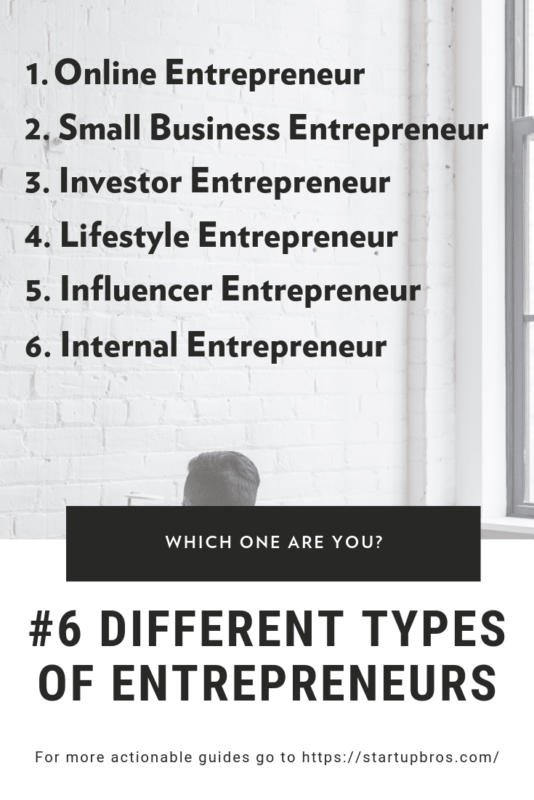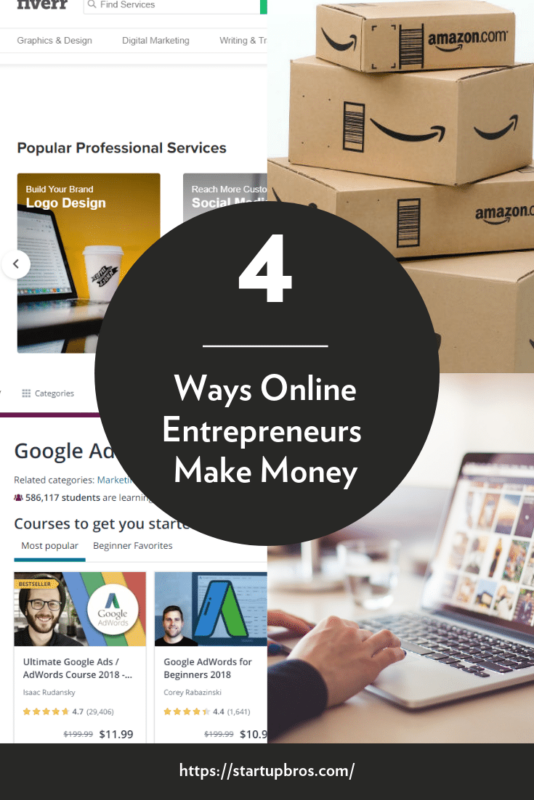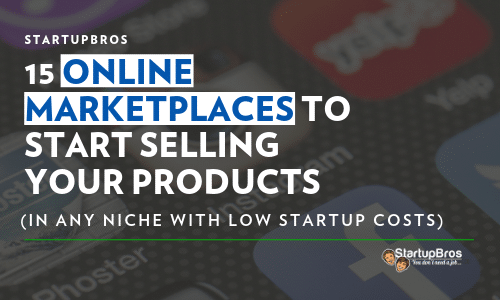The type of entrepreneur you are should change throughout your entire lifetime. It’s not a personality type but rather a set of skills to master and grow your business.
An entrepreneur is someone that works for themselves. But if you look around the forums and Facebook groups that argue what real entrepreneurship is…
You’ll realize that most of them have never actually launched a real business before. They’re all playing weird status games with each other that no one actually wins.
I want you to win though. So, once you decide for yourself to become an entrepreneur remember the journey’s long and you can’t stop trying to learn new skills.
Entrepreneurs are job creators who’s companies create every single product or service that we use on a daily basis.
Entrepreneurs can sell anything in these 4 categories:
- Product
- Service
- Information
- Attention
And recently, it’s never been cheaper to start a business. Which is why it looks like everyone is trying to start a business.
But in reality, there’s more than enough room for everyone to create a business for themselves.
That’s why today, I’m going to define the different types of entrepreneurs that exist and how in 2019 you need to be a mix of all of them if you plan to stand out.
Table of Contents
The 6 Different Types of Entrepreneurs
On your journey there’s a chance you bounce around between these categories.
Some types of entrepreneurship need money or influence to be effective. While other types of entrepreneurship need sweat equity and hard work.
NOTE: This guide is not a fluff piece. This is an action guide to show you the type of entrepreneur you can be with the resources to help you actually become one.
So remember, you won’t be the same entrepreneur you were when you started.
That’s why it helps to understand how all the different categories of Entrepreneurship work together to create your own growth plan.

These are the 6 most common types of entrepreneurs in 2019:
- Online
- Small Business
- Investor
- Lifestyle
- Influencer
- Internal
But first…
What is an Entrepreneur
The definition of an entrepreneur is this…a person that starts a business, taking on financial risks in the hope of profit.
There’s no guarantee of success and there’s usually no help when you run into trouble. An entrepreneur assumes most of the risk but gets all of the upside.
And with a surge in entrepreneurship over the past few years a one size fit all description is not helpful anymore. Also, you don’t have to drop out of college or wear black turtlenecks to be an entrepreneur either.
So we decided to put together a list of the different types of entrepreneurs to give you an idea of where you fall.
Let’s start…
1. The Online Entrepreneur
An online entrepreneur is someone who makes their living selling a product, service or information online.
How does an online entrepreneur make money?
- Selling products on their website (Private Label, Dropshipping)
- Using 3rd Party Marketplaces (Amazon, eBay, Etsy, Wish)
- Selling Information (Online course)
- Offering a service online (Freelance, Paid Ads)

Let’s go through each one quickly…
Business Models to Sell Products Online
There are only 3 business models used to sell physical products online:
- Private label
- Dropshipping
- Retail and Online Arbitrage
Private label means you choose a product to sell, have a factory manufacture it, you hold the inventory and you sell it on your own website.
Think of private label like Nike or Lulu Lemon. They’re brands that create their own products and sell directly to their customer. If you’re struggling on on the idea stage we have an article about the best private label product ideas for 2019.
Dropshipping is a business model where a factory creates a product and you sell it online without holding any inventory.
Tip: As your dropshipping business expands, consider hiring an independent contractor to handle the routine tasks, freeing up your time to focus on new business opportunities.
It’s your job to get the product in front of the customer at a reasonable price. We actually wrote a post about creating a dropshipping clothing line here.
But if you’re passionate about something it can be extremely rewarding to create your own product at your high standards and share it with the world. For example, the business I co-own is a private label beauty company that directly sells to salons. Check it out here.

Now, let’s look at online marketplaces.
3rd Party Online Marketplaces to Sell Products
If you don’t want to create your own website or look for customers yourself you can use marketplaces like Amazon or eBay.
We wrote about the 15 of the best marketplaces to sell products online in this post if you want to check it out.

These are the 3 most popular online marketplaces:
- Amazon
- eBay
- Wish
It’s easier to use sites like Amazon or eBay to start an online business because you can test ideas and see if there’s a demand. You don’t need a lot of money to start and it’s a great way to bootstrap your first business. We have an entire presentation on /ecommerce-workshop”> /ecommerce-workshop”> /ecommerce-workshop”> /ecommerce-workshop”>starting an Amazon business here.
Remember, you can use both private label and dropshipping business models to sell on Amazon, eBay and Wish. But if you’re low on money to start, people are buying items at thrift stores and selling them online.
One of the most common questions we get is about needing a license to sell products online and we cover that topic entirely here.
How to Sell Online Courses
Entrepreneurs can use online learning platforms to sell courses on information they are experts in. For example, selling a course on magic tricks or dunking a basketball.
Now, before you think that no one would buy online courses like that that think again.
Market research firm Global Industry Analysts projects e-learning will grow to $325 Billion by 2025.
There are 3 ways to sell online courses:
- Self hosted on your own website
- Sign up for a course host
- Use an online course marketplace
Let’s breakdown some options for each category.
These are the best options if you want to create an online course and have it on your website.
- LearnDash
- Lifter LMS
- WP Courseware
But what if you don’t want to have a course hosted on your own website? Well, there are two options…
There are platforms that host your online course and you brand it under your domain. (example) course.website.com. But it’s your job to make sure people see you have a course for sale.
The second option is using an online course marketplace. You can publish your entire online course there and people looking to learn about what your teaching see your course and buy it. It’s like an Amazon for online courses. The downside of online course marketplaces is that you can’t control your course prices and you pay a percentage of course sales.
When you’re starting out and new to course building these 4 options are a great way to get started at a low cost.
- Teachable (Course Host)
- Kajabi (Online Course Host)
- Udemy (Course Marketplace)
- Skillshare (Course Marketplace)
It’s never been a better time to create an online course. Because not only do individual people want to learn skills but companies and huge corporations want their employees to stay on top of their changing industries.
The opportunity to create courses that appeal to people and businesses has never been more possible.
How to Sell a Service
The final way to be an online entrepreneur is to sell a service.
When you have absolutely no money to start a business then offering a service is how you bootstrap your business. All you need is a skill, a laptop and a hustle to make money.
These sites are great to get started and launch your freelance career:
- Upwork
- Fiverr
- Freelancer
- PeoplePerHour
- Freeeup
There are freelancers making $10,000 per month offering their services online.
It’s not the “ideal image” of an entrepreneur but your services are something you have 100% control over and no one can ever fire you.
You control your own destiny as long as you keep finding clients. Freelancing is the perfect side hustle for someone still working a full time job and trying to transition into becoming their own boss.
Go on any one of those websites I listed above and see the kinds of skills people are looking for. I guarantee that you know at least 5 skills that you can offer.
2. The Small Business Entrepreneur
Small business Entrepreneurs typically provide a service to a person or another small business.
Most local businesses are considered small especially if they are family owned and have less the 50 or so employees.
For example, pool cleaners and lawn care companies are small businesses because they provide a service. (Can you tell I live in Florida?)
Service businesses are perfect for the solo type of entrepreneur without money but has a skill that someone can pay them for. It’s a lean way to slowly start a business and avoid taking on debt.
How to market your small business:
- Online
- Local Flea Markets
- Chamber of Commerce Meetings
- At Local Businesses
If you go to any local street fair or flea market on the weekends you’ll see people selling things like handmade soap, art, decorations and playing music. It’s not a giant leap to go from being a small business entrepreneur to becoming an online type of entrepreneur.
It’s positioning yourself that becomes important. That street musician can also be a local party or wedding guitarist with a great looking website. The type of entrepreneur you are completely depends on your ability to see different possibilities.
3. The Investor Entrepreneur
At the highest level of entrepreneurship sits the angel investor. This is the silicon valley type of entrepreneur who made their money starting businesses and now is looking to help the next generation.
The type of entrepreneur you need to be as an angel investor is someone who takes massive risks.
They can leverage the relationships they’ve built over the years and their name to invest in companies during the early stages of funding.
One of my favorite articles on angel investors is by Tech Crunch: Why Angel Investors Don’t Make Money … And Advice For People Who Are Going To Become Angels Anyway
These are the rules you should follow to be an Angel Investor:
- Assume you are going to lose all your money.
- Don’t do it unless you are worth at least $1 million or earn at least $200,000 per year.
- Try to build a portfolio of at least 15 companies.
- Limit the size of your angel portfolio to 10 percent of your investible assets.
It’s a select few people that make it to this level of entrepreneurship but believe me they started with everyone else. They hustled to make their money and now they’re looking to keep the next generation of growth startups going.
A good sign that you might be an investor-preneuer is if you’re already trading/investing in stocks on your own! Maybe you can find the best cheap stocks to buy right now
4. The Lifestyle Entrepreneur
A lifestyle entrepreneur is a type of entrepreneur that focuses on creating an environment where they can set their own schedule and live wherever they want. The goal is to be as flexible as possible and maximize enjoyment. Normally the people who are lifestyle entrepreneurs are called “digital nomads” or solopreneurs.
A solopreneur is a person who operates entirely on their own, and without support from a team. They don’t have business partners and if they do need help they hire freelancers to do some work for them.
Solopreneurs are interested in keeping their costs low because they’re focused on making sure they can afford their minimalist lifestyle as long as possible.
Businesses run by solopreneurs can grow and make six figures per year but growth isn’t the main goal. A common business they like to run is an online t-shirt business.
How do lifestyle entrepreneurs make money?
They create a business around a passion and keep it completely online.
Typically they focus on low cost online businesses like:
- Blogging
- Freelancing
- Online Courses
- eCommerce
Digital nomads were made famous by Tim Ferris in his book “The 4 Hour Workweek”. They’re solopreneurs that live wherever they want and only need a good wifi connection to work full time. Both make money by selling products online, providing a service or selling an information course.
5. The Inluencer Entrepreneur
An influencer is someone that built an audience around a topic and then sells exposure to that audience.
For example, in the past the biggest influencers were Hollywood celebrities but because of the internet anyone can gain their own audience.
There are 4 ways to grow an audience:
- Public speaking
- Writing (blogging, books, social media)
- Video (TV or Youtube)
- Audio (Podcast)
Influencers are entrepreneurs with a loyal audience. You can see how this can overlap with the other types of entrepreneurs. The difference between an influencer and an online entrepreneur is that the online entrepreneur is selling a product, service or information.
The influencer shares their knowledge for free but then charges advertisers to sell to their audience.
6. The Internal Entrepreneur
An intrapreneur is an entrepreneurially-minded person who works within a larger company or organization.
The intrapreneur can be every bit as valuable to the business as an entrepreneur because they can be irreplaceable to the decision makers.
They embody the same business-mindedness, innovation and creativity that entrepreneurs do, often starting their own ideas and campaigns without hand holding. All the entrepreneurs on this list NEED intrapreneurs to work for them.
Intrapreneurs are the lifeblood of a company because they take ownership of their work, never lack accountability and focus on all the things the entrepreneur cannot.
What you should expect from intrapreneurs:
- Self motivated and take accountability
- Carefully use company resources as if their own
- Become great leaders in the company
- They have a sense of ownership coming into work
The internal entrepreneur is a not a type of entrepreneur in the traditional sense but it’s a way of acting. Internal entrepreneurs stay because they believe in the vision of the business and don’t want the added risk of working for themselves.
For a company to grow as big as it can, it needs employees that think of themselves as intrapreneurs.
Honorable Mention – “Wantrepreneur”
A wantrepreneur is someone who wants to start their own business but hasn’t taken any action to get the ball rolling. All entrepreneurs are technically wantrepreneurs in the idea stages of their start ups.
Remember this, there are plenty of wantrepreneurs in the world, because it’s anyone who dreams of running their own businesses and escaping the rat race.
But only a few that get their ideas off the ground and running.
Why can’t one of those people be you?
Wrapping This Up…
If you look at other articles about the different “types of entrepreneurs” you’ll find something completely different than this article.
That’s because I want you to do the damn thing! Realize that all the entrepreneurship models crossover and the only thing left to do is take action!
Our goal at StartupBros is to give you the tools necessary to take action on your ideas.
Are you stuck trying to figure out an idea to get started? Do you need some motivation? We’re here to help…
Once you know which type of entrepreneur you are, let us know in the comments below.

what is the best way to call a freelancer + Wannapreneur?
Depends on what you’re doing 🙂 If you are a full time freelancer then you’re “self employed” and you’re an entrepreneur in my opinion!
what do you call someone who works a 9-5 and build a business in addition?
a side hustler lol
I believe that if you’re out there trying to build a business and you’re making money then you’re an entrepreneur. Once you quit your job then you’re a full time entrepreneur haha but still an entrepreneur, so keep up the hard work!
I have come across “Inno-preneur” and “Market-preneur”.
Hey Ranee, I’ve never heard of those! Can you explain those a bit more?? 🙂
I heard the term couplepreneur recently to describe a couple running a business together, no doubt quite a large group
Oh yea, I think that if a couple (married or not) can work together it can be awesome for both the business and the relationship!
I want to build my enterpreneurship around my passion for helping people with my Counselling & Life Coaching Services…
Am I a Socialpreneur?
Or, for my Zeal towards Life & Hope, I could be called:
“Lifepreneur”, “Hopepreneur” … or …. ” …
…….YOu Too suggest…
Of course if you’re dealing with helping people in need then most of the time you would be considered a Socialpreneur! I love the idea of hopeprenuer, I think it sends an incredible message to people 🙂 Keep it up Prakash!
Prakash, something I think that’s more important than defining yourself as a type of entrepreneur is having your passion for coaching be in the name of your business. You’re an entrepreneur with an incredible life mission and I think that should be highlighted more!
What do you call single women/men who are entrepreneurs?
we naturally think it will be singlepreneur, but search results on the internet show singlepreneurs are all about dating…
any other suggestions?
That’s right Anthea, “singlepreneurs” are people that are working as coaches in the dating niche. You’re an entrepreneur if you have your own business, period! It doesn’t matter too much if you’re single or not. You’re doing something awesome for yourself and that makes you an entrepreneur.
I want to practice for spelling bee on entrepreneurship words. i am sure this will help.thanks a lot.
Thanks for checking out the article Benita 🙂 Hope the spelling bee went well!
What of a salaried employee who is also an entrepreneur,.how do you call that person?
worker-preneur
That’s a good one!
Hey Bastu, I think we call that now an “Intrapreneur” someone that has entrepreneurial tendencies and works for someone.
Great post! My daughter is a preneuress. I enjoyed reading your fantastic article.
Hey Sharon, how is your daughter doing with her business? Hope she is well 🙂